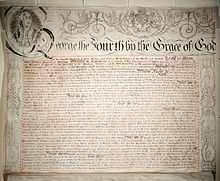letters patent
English
[edit]Etymology
[edit]
From letters patents (archaic), from Late Middle English lettres patentes, lettres patent (“document or documents granting a privilege, power, or right, making an appointment or decree, etc.”) [and other forms],[1] from Anglo-Norman lettres patentes (the plural of lettre patente), from Latin litterae patentēs,[2] the plural of littera patēns (so called because they were written on open sheets of parchment), from littera (“letter”) + patēns (“accessible, open”) (the present active participle of pateō (“to be accessible or open; to be clear or evident”), from Proto-Indo-European *peth₂- (“to spread out; to fly”)). The English term is analysable as letters + patent (“open, unconcealed; (archaic) open to public perusal”).
Pronunciation
[edit]- (Received Pronunciation) IPA(key): /ˌlɛtəz ˈpeɪtənt/, (slightly less common) /-ˈpæ-/
- (General American) IPA(key): /ˌlɛtɚz ˈpætənt/, (rare) /-ˈpeɪ-/
Audio (US): (file) - Rhymes: -eɪtənt, -ætənt
- Hyphenation: let‧ters pat‧ent
Noun
[edit]letters patent pl (plural only)
- (law) A type of legal document in the form of an open letter issued by an authority to direct that some action be taken; to grant a monopoly, right, status, or title to a person or organization; to record a contract.
- Antonym: letters close
- Hypernym: open letter
Usage notes
[edit]- The term is typically used in the plural form, even for a single document.
- In British crown colonies, the document often forms that colony's constitutional law along with the royal instructions.
Alternative forms
[edit]- letter patent (rare)
Translations
[edit]
|
Noun
[edit]References
[edit]- ^ “lettre(s [patent(e]” under “patent(e, adj.”, in MED Online, Ann Arbor, Mich.: University of Michigan, 2007.
- ^ “letters patent, n.”, in Lexico, Dictionary.com; Oxford University Press, 2019–2022.
Further reading
[edit] letters patent on Wikipedia.Wikipedia
letters patent on Wikipedia.Wikipedia - “letters patent, n.” under “patent, adj.”, in OED Online
 , Oxford: Oxford University Press, July 2023.
, Oxford: Oxford University Press, July 2023.
- English terms derived from Proto-Indo-European
- English terms derived from the Proto-Indo-European root *peth₂-
- English terms inherited from Middle English
- English terms derived from Middle English
- English terms derived from Anglo-Norman
- English terms derived from Latin
- English compound terms
- English terms with IPA pronunciation
- English terms with audio pronunciation
- Rhymes:English/eɪtənt
- Rhymes:English/eɪtənt/4 syllables
- Rhymes:English/ætənt
- Rhymes:English/ætənt/4 syllables
- English lemmas
- English nouns
- English multiword terms
- English pluralia tantum
- en:Law
- English non-lemma forms
- English noun forms
- English adjective-noun compound nouns
- English terms where the adjective follows the noun
- en:Constitutional law
